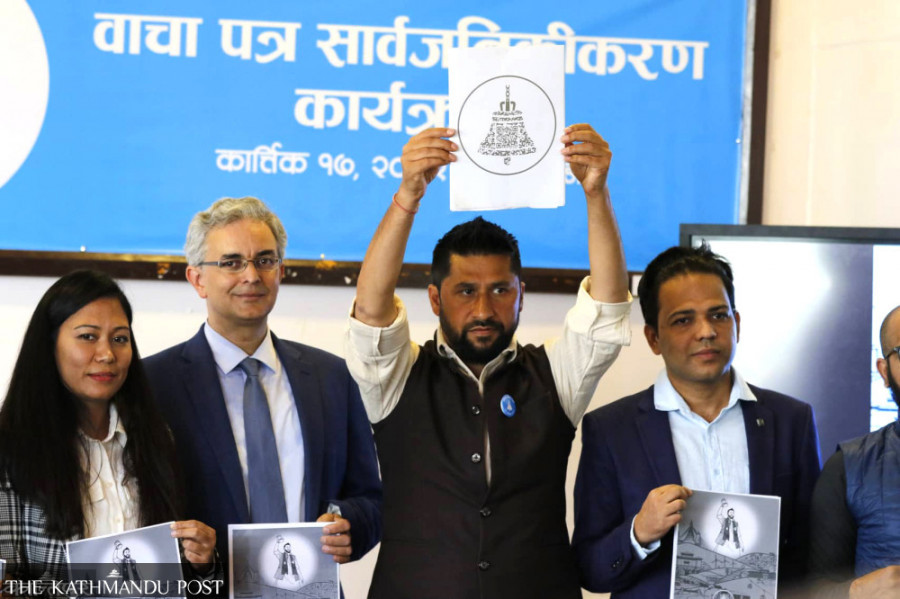Politics
RSP stuck in the muck it promised to clean up
The proponents of alternative politics have been mired in controversies, one after another.
Nishan Khatiwada
The leakage of an audio recording where the Rastriya Swatantra Party (RSP) lawmaker Dhaka Kumar Shrestha is purportedly asking for a bribe has caused a stir. The party has suspended Shrestha and its central discipline committee has been entrusted with completing an “in-depth investigation” into the matter within three days.
In the audio conversation from January 15 which was leaked on Sunday, the person believed to be Shrestha asks for Rs20 million from another person, presumably the controversial medical entrepreneur Durga Prasai, so that Shrestha can become the health minister and “bring about radical reforms in the health sector.”
The money, says Shrestha in the recording, would be passed on to “Rabi Lamichhane’s core team members.”
The party’s chief whip Santosh Pariyar apologised before the House of Representatives on Monday, saying that while the party was investigating the matter, the RSP would like to tender an apology as the incident had belittled the prestige of the sovereign parliamentarians.
Meanwhile, addressing an election assembly in Bara on Sunday, party chair Rabi Lamichhane claimed that the party will complete the investigation and punish Shrestha if he is found to be guilty.
Many of Shrestha’s past wrongdoings are now coming to light. He had been running a hospital in Pokhara, even though he only had a licence to operate a medical store.
He used to operate the Sathi Kisan Krishi Cooperative Limited, which has refused to return the money of its depositors for months now. Shrestha had left the organisation last year, handing over the leadership to Shani Pathak. But the new leadership could not start working as the old leadership had failed to maintain proper account books.
Some RSP leaders who were familiar with Shrestha’s past wrongdoings had warned the party chair Rabi Lamichhane not to nominate him for lawmaker. “But the chair still picked Shrestha,” said one RSP central committee member.
On Sunday morning, speaking to journalists in Chitwan, Home Minister Narayan Kaji Shrestha promised a thorough investigation in the bribery case. However, Home Ministry officials said an investigation in the matter was yet to start.
Dhaka Kumar Shrestha was elected to the lower house last year from the indigenous nationalities category under the Proportional Representation system. The RSP became the fourth-largest force in the House of Representatives from last year’s major polls, winning 20 seats.
The audio tape leak has added to the recent woes of the party that claims to be at the forefront of alternative politics in Nepal.
The party had disregarded its own commitment to trimming the costs of the state by accepting the position of the deputy prime minister and a state minister. It also seemed to be in a strange hurry to get into the government, rather than work towards organisation-building, as its election mandate seemed to warrant.
The Supreme Court then stripped party chair Rabi Lamichhane of his membership of parliament after it found him guilty of holding dual passports.
The RSP champions good governance and zero tolerance on corruption. On Friday, it had even backed away from supporting the new Common Minimum Programme when its pet anti-corruption agendas were not included in it. However, now the party is itself being rocked by a corruption scandal.
Political analyst Indra Adhikari said the Rastriya Swatantra Party is a leader-centric outfit which revolves around the personality cult of its chair. “Questions should be raised over his ethics, transparency and his commitment to law and justice,” she said. “In my view, Rabi Lamichhane is not an ideal character to lead the kind of alternative force that our society seeks.”
Former star TV presenter Lamichhane had launched a new party on June 21 and got it registered with the Election Commission on July 1 last year. The party got massive support from the youths across the country and swept to landslide victories in the major polls, especially in the urban areas.
But observers say the party is already betraying its promises and proving to be no different to the more established parties it mocked for their inefficiency and corruption.
Rajendra Maharjan, another political observer, said the party had emerged in national politics in the backdrop of traditional parties’ lack of delivery and bad governance; it was not a product of a political movement, nor did it have an underlying ideology.
“What is the ideology that guides them? What is the alternative political culture that they espouse?” Maharjan told the Post. “Right now, they are no different than the other parties in fray. The lack of ideological coherence and shortage of internal discussion in the party is only now becoming clear.”
According to Adhikari, RSP leaders have proven to be masters at making big promises but weak in delivery. She added that the party, just like the others, would struggle to distance itself from the powerful financiers given the rising cost of day-to-day operations of the political parties and of the national elections.




 13.12°C Kathmandu
13.12°C Kathmandu














